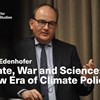station
Climate change: Life and death
John Broome, White's Professor of Moral Philosophy The international community has agreed on the aim of avoiding dangerous interference with the climate system. Determining what level of interference i
The importance of protecting religious buildings in war
It has been a long and violent conflict, but the parties have finally come to an agreement to put down their weapons – now it’s time for peace to settle in society. Unfortunately, there are a limited
Talk about climate change so everyone listens!
In six months libraries and schools will once again be transformed into voting stations and the Swedish people will vote for the Sweden they want for the next four years. A question that has been on p
The Effect of Parental Wealth on Tenure Choice: A study of Family Background and Young Adults' Housing Situation
The aim of this paper is to investigate whether parental wealth influences the tenure choice of young adults. Data from three birthcohorts that entered the housing market during different periods sugg

Ottmar Edenhofer: A New Era of Climate Policy
Research seminar with Ottmar Edenhofer, who is Director and Chief Economist of the Potsdam Institute for Climate Impact Research as well as Director of the Mercator Research Institute on Global Common
The Future of the Philosophy of Work
Journal of Applied Philosophy Abstract Work has always been a significant source of ethical questions, philosophical reflec-tion, and political struggle. Although thefutureof work in a sense is always a
Discrimination and Future Generations
In: Mosquera, J. & O. Torpman (ed.),Studies on Climate Ethics and Future Generations vol. 6. Working Paper Series 2024:10–17 Abstract In this paper, I analyse whether the present generation’s choices. This has been tentatively suggested in both legal theory and philosophy; I review such suggestions briefly in section 1. However, a more rigorous analysis – outlining the concept, relevant grounds, and wrong-making features of discrimination, and applying these to future generations – is still lacking. To address this lacuna, I propose a theory of discrimination and analyse why it might seem to apply – yet ultimately fails to apply – to the differential treatment of future generations. More specifically, I propose a definition of discrimination (section 2.1) and an account of the moral wrongness of discrimination (section 2.2). I moreover explore the connection between discrimination and theories of social (in)justice (section 2.3). I then apply this theory to the problem of differential treatment of future generations. While discrimination may occur between collectives, such as generations (section 3.1), my analysis shows that the specific temporal status of future generations is not comparable to other grounds of discrimination, such as gender or race (section 3.2). Moreover, due the non-identity problem and the problem of lack of a “community of social meaning” between generations, future generations cannot be claimed to be subjected to worse treatment by the present generation (section 3.3). Hence, their differential treatment due to the present generation’s choices does not amount to discrimination. Section 4 concludes and outlines some upshots of my analysis.
Ottmar Edenhofer: Climate, War and Science. Practical Dilemmas, Theoretical Challenges and a New Era of Climate Policy
Venue: Institutet för framtidsstudier, Holländargatan 13 , 4th floor in Stockholm, and online REGISTER >Research seminar with Ottmar Edenhofer, who is Director and Chief Economist of the Potsdam InstAbstractStarting by stating the current status quo of climate change, the talk focuses on the practical dilemmas an ambitious climate policy is facing, also on the grounds of the theoretical challenges involved. The present geopolitical global situation is calling for a new era of climate policy. But how do we get there?
Sequences of democracy and development
USAID Center for Democracy and Governance & NORC at the University of Chicago, September 2020. AbstractScholars have long studied the correlation between democracy and development; yet, there is no









